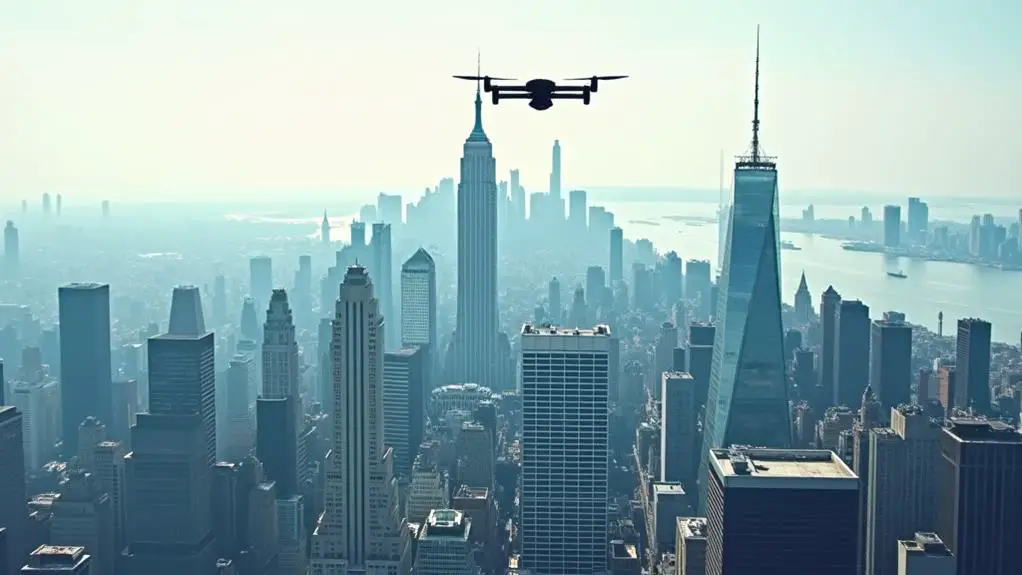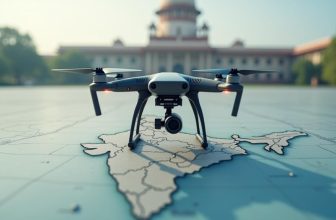
You're about to enter a regulatory minefield with over a million rules and regulations to navigate – okay, maybe not a million, but it can certainly feel that way when it comes to flying a drone in New York. As you prepare to take your drone to the skies, you're probably wondering what you need to do to avoid getting in trouble. Do you need a license, or can you just register your drone online? What about restricted areas – can you fly over that beautiful national park or the bustling city streets? The answers to these questions are vital, and getting them wrong can have serious consequences.
Contents [hide]
Key Takeaways
- Registration with the FAA is required for drones weighing more than 0.55 pounds and less than 55 pounds in New York.
- Recreational drone pilots must maintain visual line of sight, avoid flying over people, and respect restricted airspace and private property.
- National Parks, military bases, prisons, and areas with Temporary Flight Restrictions are off-limits to drone pilots in New York.
- Commercial drone operators must obtain a Part 107 remote pilot certificate, which requires a knowledge test, eligibility, and a TSA background check.
- Non-compliance with drone regulations in New York can result in fines up to $27,500, imprisonment, or revocation of privileges.
Recreational Drone Use Laws
Before you take to the skies with your drone in New York, it's vital that you brush up on the state's recreational drone use laws.
As a drone operator, you'll need to follow the rules set by the Federal Aviation Administration (FAA) and the state of New York.
For starters, you're required to register your drone if it weighs more than 0.55 pounds and less than 55 pounds.
You must also mark your drone with the registration number and have proof of registration on hand.
When flying, maintain a visual line of sight with your drone and avoid flying over people or in restricted airspace.
Drone etiquette is also essential in New York, particularly when it comes to aerial photography.
Respect private property and don't fly over areas where people may be disturbed.
You're also not allowed to fly near airports, national parks, or other sensitive areas.
Always check local regulations and weather conditions before flying, and never fly recklessly or near emergency responders.
Commercial Drone Regulations
You'll need a different set of rules to follow if you plan on using your drone for commercial purposes in New York.
To operate a commercial drone in the state, you must register your drone with the Federal Aviation Administration (FAA) and obtain a Part 107 remote pilot certification.
This certification requires you to pass a knowledge test and meet specific eligibility requirements.
Pilot certification requirements also include being at least 16 years old, able to read, speak, write, and understand English, and being in a physical and mental condition to safely operate a drone.
You'll also need to pass a Transportation Security Administration (TSA) background check if your drone weighs over 55 pounds.
In addition to certification requirements, you should also weigh drone insurance options.
These policies can help protect you from liability in case of an accident or damage to property.
You may want to ponder a policy that covers you for at least $500,000 in liability.
Before choosing a policy, make sure you understand what's covered and what the requirements are for filing a claim.
Restricted Flying Areas
In New York, several areas are off-limits to drone pilots due to safety concerns or environmental restrictions.
You need to be aware of these restricted flying areas to avoid any potential penalties or damage to your drone. National Parks, for instance, are off-limits to drone pilots. This includes places like the Statue of Liberty National Monument, Niagara Falls, and the Women's Rights National Historical Park.
Additionally, Military Bases are also restricted areas, and you're not allowed to fly your drone near or over these bases.
This includes the Fort Drum Army Base, the Niagara Falls Air Reserve Station, and the West Point Military Academy. You should also be cautious of other restricted areas like prisons, power plants, and areas with Temporary Flight Restrictions (TFRs).
To avoid any issues, you should always check the Federal Aviation Administration's (FAA) website for the most up-to-date information on restricted flying areas before you take to the skies.
This will help you plan a safe and enjoyable flight.
Registration and Licensing
When operating a drone in New York, registering your device is a critical step in the process.
You must register your drone with the Federal Aviation Administration (FAA) if it weighs more than 0.55 pounds and less than 55 pounds. Recreational drone pilots must register their drones online and pay a $5 registration fee.
You'll receive a unique registration number that must be displayed on your drone.
Commercial drone operators, on the other hand, must obtain a Part 107 remote pilot certificate from the FAA.
This requires passing a knowledge test and maintaining a valid certification.
Pilot certification pathways include studying for the knowledge test on your own or taking a course from an FAA-approved provider.
Additionally, you should consider drone insurance options to protect yourself and others in case of an accident.
Drone insurance policies can cover liability, damage to your drone, and other risks.
By registering your drone and considering insurance options, you can guarantee a safe and compliant flight experience in New York.
You can find more information on the FAA's website or by consulting with a certified drone pilot or instructor.
Enforcement and Penalties
The Federal Aviation Administration (FAA) and local authorities in New York take enforcement of drone regulations seriously, and penalties for non-compliance can be severe.
If you're caught flying a drone recklessly or without proper registration, you could face fines, imprisonment, or both.
Law enforcement agencies, such as the New York State Police and local police departments, work closely with aviation authorities to monitor and enforce drone regulations.
They may use various methods to detect and track unauthorized drone activity, including radar and surveillance systems.
If you're found to be in non-compliance with drone regulations, you could face the following penalties:
- Fines: Up to $27,500 for civil penalties and up to $250,000 for criminal penalties.
- Imprisonment: Up to three years in prison for serious offenses, such as flying a drone near an airport or in a restricted airspace.
- Revocation of privileges: Loss of your pilot's license or registration, which could prevent you from flying a drone in the future.
It's essential to understand and comply with drone regulations in New York to avoid these penalties and guarantee safe and responsible drone operations.
Frequently Asked Questions
Can I Fly a Drone Over a Neighbor's Property in New York?
You're considering flying a drone over a neighbor's property in New York. Be aware that air privacy laws might be breached. Respect property boundaries and obtain explicit permission to avoid trespassing and potential lawsuits.
Do I Need Insurance for My Drone in New York State?
You're likely one of 868,000+ drone owners in the US. While New York doesn't require drone insurance, you'll want it for Drone Liability protection. A policy coverage will shield your assets in case of accidents or lawsuits.
Can I Use My Drone for Search and Rescue Operations?
You can use your drone for search and rescue operations, providing Emergency Response teams with valuable aerial support. Obtain necessary certifications and follow FAA guidelines to guarantee safe and effective drone deployment in emergency situations.
Are There Age Restrictions for Flying Drones in New York?
Are you too young to fly a drone in the Empire State? In New York, you must be at least 16 to fly a drone without adult supervision, as per youth regulations, limiting minor privileges.
Can I Fly a Drone Over a Private Beach in New York?
When flying a drone over a private beach in New York, you'll need to respect private boundaries and consider coastal regulations, such as those related to endangered species or sensitive habitats, before taking off.
Conclusion
As you navigate drone laws in New York, remember to stay informed and up-to-date on the latest regulations. Failure to comply can result in serious penalties. Can you afford to risk fines and imprisonment for a moment of carelessness? By registering your drone, obtaining necessary certifications, and respecting restricted flying areas, you can guarantee a safe and enjoyable experience for yourself and others. Stay vigilant and responsible – it's your duty as a drone pilot.






